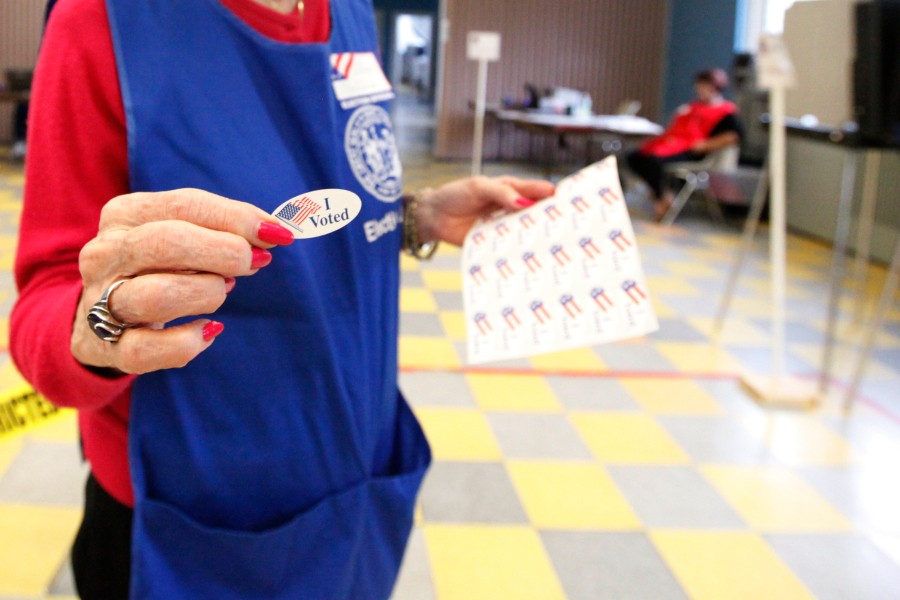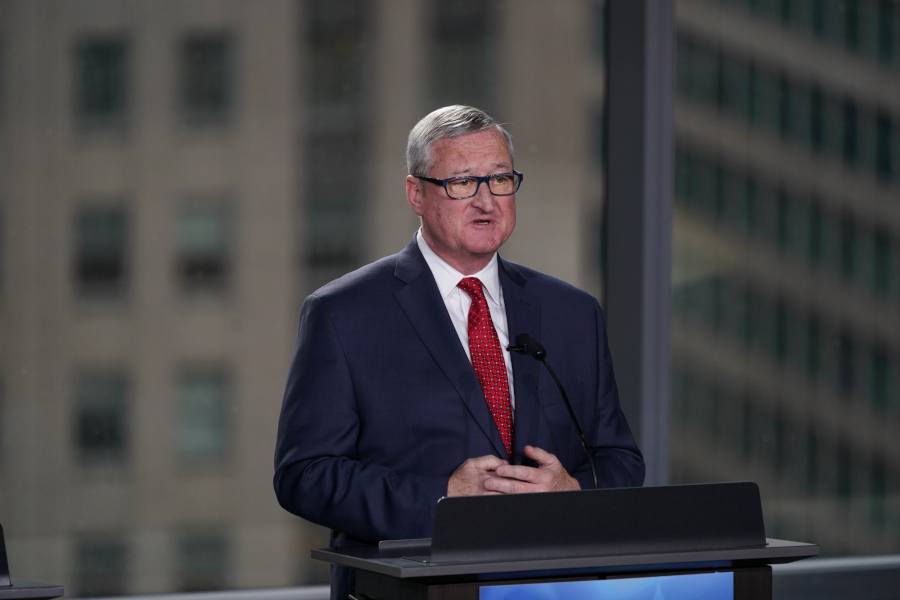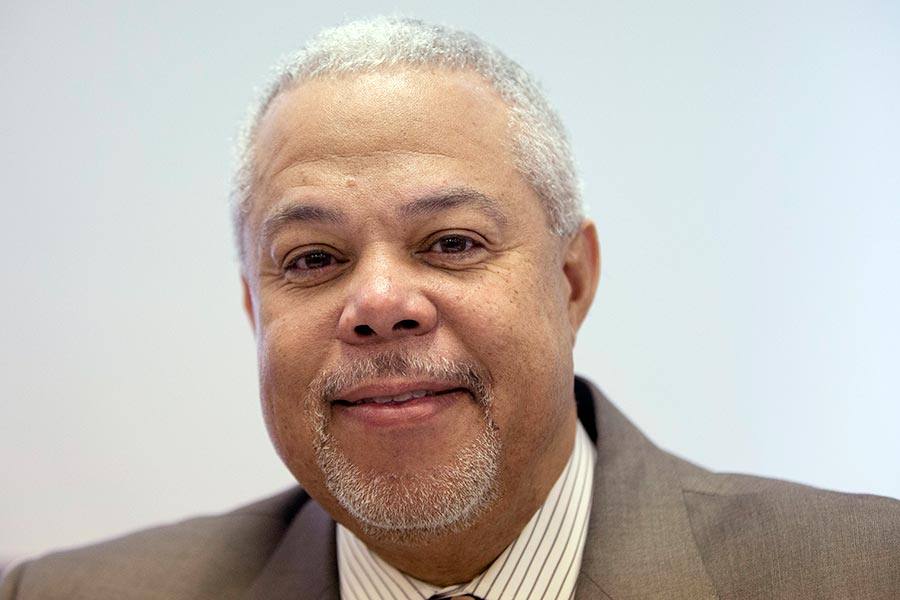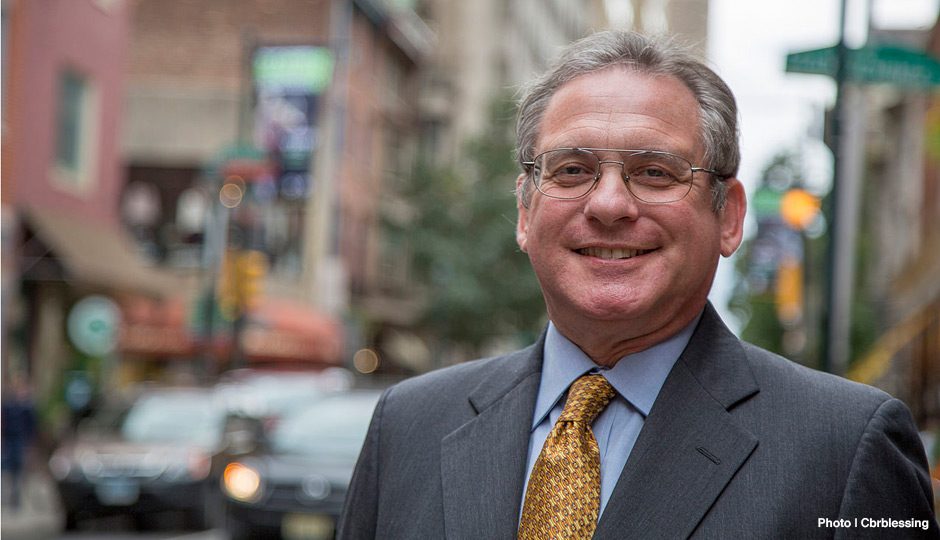The No-B.S. Guide to the 2019 Primary Election
You’ll have plenty of candidates to choose from on Tuesday (especially when it comes to the City Council at-large race). Here’s your opportunity to read up.

Philly voting registration rose notably between the May primary and the general election deadline this October. | Photo by jdwfoto/iStockphoto.com
The 2019 municipal primary is nearly here, Philly.
If you’re registered to vote, you should absolutely get to the polls on Tuesday. There’s a lot at stake when it comes to local politics: Mayor Jim Kenney is up for reelection, for starters, and he’s got two primary challengers. You’ll also have the opportunity to vote for new at-large and district City Council members — and there are plenty of candidates to choose from this year (the most at-large competitors we’ve seen since 1979, in fact).
A few other races might not involve candidates with as much name recognition — like city commissioner, sheriff, register of wills, and judge — but they’re all important.
Below, you’ll find our no-B.S. guide to the 2019 primary. Read up on the following races (and the ballot questions), before you head to the polls.
- Mayor
- City Council (District)
- City Council (At-Large)
- City Commissioner
- Sheriff
- Register of Wills
- Judicial Elections
- The Ballot Questions
First Up: The Mayoral Election
As mentioned, Mayor Kenney’s Democratic challengers are state Sen. Anthony Williams (who, you may remember, came in second to Kenney in the 2015 primary) and former city controller Alan Butkovitz. The sole Republican mayoral candidate is Billy Ciancaglini.
Kenney has history on his side: No incumbent mayor has lost a primary in seven decades. But Williams and Butkovitz have been running fierce campaigns against him in recent weeks. Here’s what you need to know about each candidate.
Jim Kenney
The basics: 61. Incumbent. Served as an at-large City Council member for 23 years prior to running for mayor in 2015.

Photo by Joe Kaczmarek via NBC10
The pros: Chances are you’re familiar with the mayor — and some of the major accomplishments in his first term. Chief among them is passing the sweetened beverage tax. The levy, which faced an uphill battle against skeptics and the American Beverage Association, showed the mayor’s ability to rally City Council behind bold ideas. The programs the tax funds (universal pre-K and community schools, as well as recreation centers and parks) also display Kenney’s top priority as mayor: education. And when it comes to that, Kenney boasts another win: bringing control of the city’s school district back home, out of the hands of lawmakers in Harrisburg (who, in his and many educators’ eyes, weren’t doing enough to prioritize our schools). In addition, Kenney’s administration has garnered a national reputation for standing up to ICE — and supporting undocumented immigrants — during troubling times. And finally, the mayor’s administration has also worked closely with urbanists and bicycling advocates to advance the progressive goals of Vision Zero and make Philly’s streets safer.
The cons: Kenney’s competitors have wasted no time criticizing him on his weaknesses. Most notable, perhaps, is the city’s climbing homicide rate — largely seen as unacceptable to Philadelphians who identified crime as the top issue in this year’s election, per an Inquirer poll. And while the soda tax can be seen as a big win for Kenney — and many residents support the programs the levy funds — a lot of residents oppose it. That includes both Williams and Butkovitz. Kenney’s administration has made moves to counter the opioid crisis (including shutting down encampments and ramping up outreach programs), but his critics say he’s still not doing enough. His administration’s plan to allow a safe injection site in the city is championed by some and opposed by others, including those who worry that federal opposition renders the plan unrealistic.
Go deeper:
Anthony Williams
The basics: 62. State senator. Has served 31 years in Harrisburg. Lost to Kenney in the 2015 primary.

Anthony Williams. Photo by Matt Rourke/AP
The pros: As a longtime state senator, Williams boasts deep connections to Harrisburg. He’s also appeared to have learned a lot from his 2015 run: This time around, he’s running a grass-roots campaign (instead of taking money from deep-pocketed, suburban charter school advocates), and he says he’s attempting to better understand and prioritize residents’ most pressing concerns. Like the mayor, he supports a $15-per-hour minimum wage, and he’s offered solid ideas when it comes to job creation, the tax assessment process and prioritizing diversity. Williams also wants to eliminate stop-and-frisk — something Kenney promised to do but reversed on after taking office, claiming instead that police rely on the tactic to keep our streets safe. Williams holds two strong stances that could be seen as pros or cons depending on your own views: He wants to eliminate the sweetened beverage tax, and he doesn’t support safe injection sites.
The cons: Williams hasn’t provided details regarding a sustainable revenue stream to replace funding to the programs the soda tax currently supports. (He’s mentioned the city’s budget surplus, but those funds come and go, especially in the event of a recession.) In addition, people who strongly support the sweetened beverage tax and safe injection sites probably won’t be able to get behind Williams. And there’s something else working against Williams: He’s facing an uphill battle partly because Kenney hasn’t been a disastrous mayor — some residents might be hesitant to throw their support behind Williams if they’re pleased with the progress Kenney has made. (Philadelphia magazine argues in its endorsement of Williams that the city should take a chance on the state senator.)
Go deeper:
Alan Butkovitz
The basics: 67. Former city controller. Lost in an upset to reformist Rebecca Rhynhart in the 2017 election.

City Controller Alan Butkovitz has a new plan to create manufacturing jobs. Photo Credit: Curtis Blessing
The pros: As former city controller, Butkovitz knows the ins and outs of city government. At the only televised debate of the mayoral race, he showed off his knowledge — citing more statistics and hard evidence than any other candidate. (Granted, he used the vast majority of that information to make Kenney look bad.) Butkovitz touts some notable ideas when it comes to crime — he wants to ramp up the city’s police force and end stop-and-frisk. Like Williams, he also comes out hard against some of Kenney’s more controversial ideas, including the sweetened beverage tax and safe injection sites (which, again, could be seen as benefits or drawbacks depending on your own views).
The cons: Butkovitz is branding himself as an insurgent, but he lost to a progressive candidate, Rebecca Rhynhart, in the 2017 city controller race. (He’s also spoken out against the ideas of Philly’s most popular political firebrand, district attorney Larry Krasner.) It’s hard to see how he’s going to come back from the 2017 race and win the mayoral election. Finally, it seems like Butkovitz’s campaign centers on taking down Kenney (and criticizing the status quo) rather than putting forward his strategy for the future — and Philly needs one.
Go deeper:
Billy Ciancaglini
The basics: 48. Lawyer. Lives in South Philadelphia. Sole Republican candidate.
What to know: Ciancaglini is running unopposed, so he’ll face off this fall against whoever wins the Democratic primary. Ciancaglini is fairly moderate for a Republican (you have to be, in Philly), but he takes hard stances on a few things. First, he’s against the soda tax and safe injection sites (like Kenney’s challengers). His biggest issue, though? Philly’s sanctuary city status. He’s extremely opposed to giving opportunities to undocumented immigrants.
City Council District Races
This year’s City Council elections challenge incumbency in the historically calcified body: Eight of 10 district incumbents will face primary challenges — last time, that same number ran unopposed.
District 1
Parts of South Philly, Center City, Chinatown, Northern Liberties, Fishtown, Kensington and Port Richmond.
Mark Squilla (Democrat, Incumbent)
Squilla was first elected to City Council in 2011. He ran unopposed in 2015. A South Philly native, Squilla has prioritized neighborhood values. He’s supported efforts to revitalize the Reading viaduct, introduced a bill banning plastic bags in Philadelphia, proposed tax-relief efforts for homeowners, and sponsored a bill expanding gender-neutral bathrooms. In 2016, he came under fire for his “Promoters Bill,” which would have required both performers and promoters to register with the city. He’s shown support for bills created to maintain and modify the soda tax, but has stayed relatively silent on the issue of repealing the property tax abatement. Recently, he’s moved to opposed a bill sanctioning safe injection sites within the city.
Lou Lanni (Democrat)
Lanni is a former police officer who now works in real estate. He previously ran for state representative in Center City’s 182nd Legislative District, and this is his second time running for the District 1 seat. His campaign this year centers on ending yearly real estate tax hikes and supporting public schools. As an openly gay candidate, Lanni says he will strengthen hate crime laws for the LGBTQ community.
Daniel Orsino (Republican)
A former orthotics manufacturer, Orsino has described himself as a “blue-collar worker from South Philadelphia and member of the LGBTQ community” who is campaigning for education reform, gay rights, and income equality. He’s also spoken out about the need for infrastructure reform, promoting green initiatives, and more funding opportunities for public transportation.
District 2
Parts of Center City and South and Southwest Philly
Kenyatta Johnson (Democrat, Incumbent)
Prior to his two-term tenure on Council, Johnson, a South Philly native, worked as a state Senate staffer and then served as state representative for the 118 Legislative District. As founder of Peace Not Guns, Johnson has been dedicated to stemming the rise of gun violence in Philly. He’s engaged in various community restoration initiatives, including championing the City’s Affordable Housing Initiative, which supports the construction of affordable housing in South Philly. He also introduced a bill to end time limits on the Longtime Owner Occupants Program, which protects homeowners from excessive tax hikes due to rises in home value. Johnson supports the soda tax, wants to reform the 10-year property tax abatement, and is opposed to safe injection sites. He has come under fire for his use of councilmanic prerogative to help a childhood friend profit from flipping city-owned building lots.
Lauren Vidas (Democrat)
Vidas, a lawyer, is a former legislative aide for City Council and assistant financial director to former Mayor Michael Nutter. She’s bounced between the public and private sectors, and co-founded a public strategies firm while she was chair of the South of South Neighborhood Association. She’s one of the few LGBTQ District candidates.
Michael Bradley (Republican)
Bradley is an Army veteran and Republican ward leader living in Grays Ferry. He’s running unopposed.
District 3
West Philly, including University City and parts of Southwest Philly
Jannie Blackwell (Democrat, Incumbent)
Blackwell, 73, is a six-term Council member. She’s held various positions during her political career, including majority leader and chair of the Education Committee and chair of the Committee on Housing, Neighborhood Development, and the Homeless. In 1999, Blackwell announced a 10-year economic development plan for West and Southwest Philly that aimed to stimulate job growth and development in the area while conserving housing affordability. Throughout her terms, she’s been criticized for how she’s handled zoning issues within her district.
Jamie Gauthier (Democrat)
Gauthier is the former executive director of the Sustainable Business Network and the former head of the Fairmount Park Conservancy. Her father, Leon Williams, twice ran for District Attorney and frequently campaigned for criminal justice reform — which is at the forefront of Gauthier’s campaign. Gauthier has said she wants to curb gentrification and fight councilmanic prerogative.
District 4
Parts of West and Northwest Philly, plus Roxborough, Manayunk and Overbrook
Curtis Jones (Democrat, Incumbent)
Jones is currently serving his third term on City Council. He’s the chairman on the committees on Public Safety and Commerce and Economic Development. During his tenure, Jones has advocated for educational, environmental, and criminal justice reform. He called for stricter amendments in the “Ban the Box” legislation that would prevent private employers from discriminating against a potential job candidate due to a prior criminal record. He also created the Philadelphia Internship Tax Credit, which allows high school and college students to receive a stipend for internship work.
Ron Adams (Democrat)
Prior to announcing his candidacy, Adams worked for WC Financial, a mortgage firm that he went on to co-own. A lifelong Philadelphian, Adams is the operations manager for the High Intensity Drug Trafficking Area Program. One of his proposals is to create a citywide drug task force composed of medical professionals, law enforcement officers, and social workers. Adams has also stated his commitment to educational reform within Philadelphia, advocating for increased technical and vocational school opportunities for students and for a better-funded school system. He’s against the soda tax, and one of his campaign promises is a full review of citywide tax programs. He supports modifying the current 10-year property tax abatement, as well as bike lanes.
District 5
Includes parts of North Philly, Kensington, Yorktown, Spring Garden, Fishtown, Strawberry Mansion and more
Darrell Clarke (Democrat, Incumbent)
Clarke, who’s unopposed, is the current City Council president. Along with Blackwell, he’s one of Council’s longest-serving incumbents. His past initiatives include championing the Actual Value Initiative and the Philadelphia Energy Campaign. Recently, Clarke has been accused of aiding North Philly developer Shawn Bullard in acquiring property to the detriment of other buyers. He supports the soda tax.
District 6
Includes Tacony, Mayfair, Holmesburg, Bridesburg, Wissinoming, Port Richmond, East Torresdale, Castor Gardens, Oxford Circle, Rhawnhurst, Pennypack, Frankford
Bobby Henon (Democrat, Incumbent)
Despite his recent indictment, Henon will is running unopposed in what could be his third term as a councilman. He previously served as majority leader in 2016 and was co-chair of the Manufacturing Task Force, which sought to expand the city’s manufacturing industry. In January, Henon was indicted along with IBEW Local 98 leader Johnny Dougherty on charges of embezzlement and theft.
Pete Smith (Republican)
Smith, the former president of the Tacony Civic Association, has criticized the Kenney administration for tax increases and for its management of the opioid crisis. He opposes the soda tax, Philly’s sanctuary city status and safe injection sites. He supports the 10-year property tax abatement.
District 7
North Philly, including Hunting Park, Kensington and Frankford
Maria Quiñones-Sánchez (Democrat, Incumbent)
Quiñones-Sánchez is currently serving her third term on City Council. A lifelong activist, she’s campaigned for revitalizing local economies through job training and creation, education, and transparency within government. She was the first Latina elected to Council, and her initiatives include business tax reform and legislation aimed at granting all citizens access to clean and accessible water.
Angel Cruz (Democrat)
Cruz, a state representative and ward leader, has faced off against Quiñones-Sánchez before — and the 7th District race has proven to be one of the most contentious this primary season. Cruz and Quiñones-Sánchez frequently butt heads during debates, though they’re aligned in their opposition to safe injection sites and the soda tax. As ward leader, Cruz boasts considerable support from his district. As a state rep, he has supported legislative measures aimed at combating the opioid crisis.
District 8
Parts of Northeast Philly, including Chestnut Hill, Mount Airy, Germantown, Nicetown-Tioga, Logan
Cindy Bass (Democrat, Incumbent)
Bass is in her second term and running unopposed. Recently, she’s championed for the installation of cameras and anti-loitering devices within her district and has advanced measures for more inclusive playground equipment for children with disabilities. Earlier this year, she introduced a bill that would abolish the 10-year property tax abatement. Bass opposes the soda tax and safe injection sites, as well as term limits for City Council.
District 9
Parts of North and Northwest Philly, including East Mount Airy, West Oak Lane, East Oak Lane, Olney, Lawncrest, Lawndale, Burholme and Oxford Circle
Cherelle Parker (Democrat, Incumbent)
Parker, a former state representative, is running unopposed. She currently serves as the vice chair of Council’s Committee on Commerce and Economic Development. Throughout her tenure, Parker has continually championed educational reform and has vigorously defended Philadelphia’s Paid Sick Leave Ordinance. She supports the soda tax, sanctuary city status, and is in favor of maintaining but modifying the property tax abatement. She opposes supervised injection sites and Council term limits.
District 10
Northeast Philly, including Bustleton, Pennypack and Parkwood
Brian O’Neill (Republican, Incumbent)
O’Neill is a veteran incumbent and is currently serving his tenth term on Council, in which he serves as minority leader. He is president of the National League of Cities and the Pennsylvania Municipal League. He supports the property tax abatement and opposes the soda tax, Council term limits, and supervised injection sites.
Judy Moore (Democrat)
Another newcomer to Philly politics, Moore is a running unopposed within the Democratic party. She’s chief strategy officer and executive vice president of the Garces Group, and her campaign priorities center on criminal justice reform, passing City Council term limits and increasing public school funding.
City Council At-Large Candidates
This race is a doozy: More than 30 candidates are running for seven at-large seats, including five incumbents: Helen Gym, Derek Green, Allan Domb, David Oh, and Al Taubenberger. We included bios for each of the incumbents and frontrunners below, as well as a list of the remaining candidates. You can vote for five candidates within your party.
Allan Domb (Democrat, Incumbent)
Elected in the 2015, Domb is owner of the eponymous real estate brokerage firm. Prior to entering City Council, he served multiple terms as president of the Greater Philadelphia Association of Realtors — which has contributed to his reputation as the “Condo King.” As part of his campaign platform, he pledged to donate his entire Council salary to Philly schools. A group of activists — the 215 People’s Alliance — has begun protesting Domb’s campaign, claiming his deep ties to the real estate market pose a conflict of interest in a public official.
Derek Green (Democrat, Incumbent)
After an unsuccessful run in 2007, Green was elected to City Council in 2015. Recently, he introduced an initiative for gender-neutral City Council titles — now a ballot question in the primary. His tenure in City Council has been marked by his support for small businesses, his defense of medical marijuana, and his proposal for a citywide independent fiscal office.
Helen Gym (Democrat, Incumbent)
In 2015, Gym became the first Asian American woman on City Council. At the time, she ran on a platform of education and housing reform — issues that she has continued to support during her tenure. Prior to becoming a councilwoman, Gym was known for her social and education activism. A former school teacher, Gym currently serves as chair of Council’s Children and Youth Committee and co-founded Parents United for Public Education and Philadelphia Public School Notebook. Recently, she’s supported multiple bills aimed at effectively revoking the 10-year property tax abatement, citing an ultimate goal of shifting those funds toward the Philadelphia school system. She wants to keep the soda tax, and she supports safe injection sites.
David Oh (Republican, Incumbent)
Oh, who’s seeking a third term, is known for penning anti-squatting laws and opposing the soda tax, marijuana legalization, and safe injection sites. Earlier this year, he said he wanted to hand over control of various Philadelphia Parking Authority functions to City Hall.
Al Taubenberger (Republican, Incumbent)
Taubenberger is currently serving his first term as an at-large Republican Council member. He’s the chair of the Committee on Aging — and is on more committees than any of his colleagues. He supports modifying the 10-year property tax abatement and opposes the soda tax, supervised injection sites, and Council member term limits.
Erika Almirón (Democrat)
Almirón is an activist with a long history of social justice campaigns for education, immigrant reform, and labor rights. She is currently on leave from her position as executive director of the immigrant rights group Juntos, which protested President Trump’s border wall proposal. She has promised to support better funding efforts for Philadelphia public schools, including creating stronger accountability from within the school board. Criminal justice reform is also a priority on her agenda, and she has been critical toward the city’s law enforcement budget and measures and advocates for decriminalizing crimes of survival. She supports maintaining and modify the soda tax and councilmanic prerogative, but supports repealing the property tax abatement.
Deja Lynn Alvarez (Democrat)
Deja, an LGBTQ rights activist, serves on the Mayor’s Commission of LGBTQ Affairs and the Pennsylvania HIV planning committee. She supports the soda tax and wants to repeal the 10-year property tax abatement program. If elected, she would be City Council’s first transgender member.
Justin DiBerardinis (Democrat)
DiBerardinis is the son of Michael DiBerardinis, who served as the city’s managing director under both Mayor Nutter and Mayor Kenney. DiBerardinis has previously served as legislative director for Council member Maria Quiñones-Sánchez. His platform centers on proposals for a “New Deal for Philadelphia,” which he says would aim to create more funding opportunities by enacting a progressive tax policy — as well as support environmentally sustainable initiatives (he’s the director of programs and partnerships at Southwest Philly’s Bartram’s Garden). He wants to reform the 10-year property tax abatement and keep the soda tax.
Sandra Dungee Glenn (Democrat)
Glenn’s position on the Board of Education (and as former chairwoman of the now-disbanded School Reform Commission) and her experience working with state Sen. Vincent Hughes and City Council members Cindy Bass and Curtis Jones appeared to be promising signs for a Democratic City Committee endorsement. But in a surprising turn of events, the endorsement fell to Thomas, with no explanation from committee members. Despite this, Glenn has voiced continued dedication to her platform, which is based on a principle of “moving people out of poverty” through focusing on four core areas: creating jobs and supporting businesses, investing in children and youth, stabilizing neighborhoods, providing affordable housing, and prompting criminal justice reform.
Beth Finn (Democrat)
Finn helped organize the 2017 Women’s March in Philly and is a project manager in healthcare analytics. Among her most ambitious policy proposals? To create a public bank that would oversee all of the city’s finances. She wants to keep but modify both the soda tax and the 10-year property tax abatement.
Katherine Gilmore Richardson (Democrat)
Richardson is the former chief of staff for City Council member Blondell Reynolds Brown, who is retiring. Richardson currently serves as vice president of the Young Philly Democrats and cites her decade of experience working with City Council as one of her most important qualifications.
Asa Khalif (Democrat)
Khalif is widely known as a Black Lives Matter Movement Pennsylvania activist. He’s organized protests against the police shooting of David Jones, the Frank Rizzo statue, and the controversial 2018 Rittenhouse Starbucks arrests, among other things. You can read our profile on him right here.
Adrián Rivera-Reyes (Democrat)
At 26, Reyes is the youngest candidate in the running — and he’s also one of the only Latino candidates and a member of the LGBTQ community. Reyes is a PhD candidate at the University of Pennsylvania and running as a Democratic Socialist. His platform focuses on providing opportunities for minorities and other underserved populations, as well as tackling the city’s opioid epidemic. He supports supervised injection sites and Council term limits. He opposes the soda tax.
Eryn Santamoor (Democrat)
Santamoor previously worked as the city’s deputy managing director under former Mayor Michael Nutter. She’s focusing her campaign on increasing public school funding, reforming the property tax abatement, and increasing Council transparency by pushing the body to release an annual itemized budget. She supports the soda tax.
Isaiah Thomas (Democrat)
Thomas is a Philly native with two previous City Council runs under his belt. He’s been called the “union candidate” for his various union endorsements, and he’s previously called himself a “champion for poor people and people of color in Philadelphia.” A former educator with a demonstrated interest in educational reform, Thomas’s agenda is largely youth focused, with an emphasis on creating educational and job opportunities for city youth as a way to stimulate the job market.
Other candidates:
- Fareed Abdullah (Democrat)
- Wayne Allen (Democrat)
- Ethelind Baylor (Democrat)
- Vinny Black (Democrat)
- Latrice Bryant (Democrat)
- Devon Cade (Democrat)
- Bobbie Curry (Democrat)
- Joseph A. Diorio (Democrat)
- Wayne Edmund Dorsey (Democrat)
- Irina Goldstein (Republican)
- Ogbanna “Paul” Hagins (Democrat)
- Bill Heeney (Republican)
- Drew Murray (Republican)
- Mark Ross (Democrat)
- Edwin Santana (Democrat)
- Billy Thompson (Democrat)
- Dan Tinney (Republican)
- Fernando Treviño (Democrat)
- Hena Veit (Democrat)
- Matt Wolfe (Republican)
City Commissioner
What to know: Philly’s three City Commissioners form a bipartisan board that oversees elections and voter registration. You can vote for two candidates within your party.
What’s at stake: Philly’s incumbent commissioners have (uncharacteristically) been making headlines over the city’s new voting machine process. We’ve got more info on that here. The debacle has prompted residents and journalists to keep a closer watch over the office than usual — and emphasized the role that commissioners play in crucial processes. The race includes two incumbents: Democrat Lisa Deeley and Republican Al Schmidt. Deeley has been involved in local politics since 1994 (including in the City Controller’s Office and Pennsylvania House), and she’s served as a city commissioner since 2016. She boasts of a number of reforms in the office — but it’s worth noting that she lost her notary license last year after she failed to check the identification of a woman whose signature she notarized. Schmidt, a big proponent of using social media to share important election data, is the only Republican on the ballot — so he’s very likely to win reelection.
Twelve other people are running. Attorney Kahlil Williams and South Philly committee person Jen Devor are candidates to watch. Other candidates (again, all Democrats) include:
- Marwan Kreidie
- Omar Sabir
- Luigi Borda
- Dennis Lee
- Annette Thompson
- Carla Cain
- Warren Bloom
- Moira Bohannon
- Robin Trent
- Lewis Harris Jr
Go deeper:
- Billy Penn’s election guide offers in-depth info on eleven of the candidates
- The Committee of Seventy’s guide to the candidates
- Philly.com’s summary on why the election (and office) matter
Sheriff
What to know: The Sheriff’s Office ensures the safety of courthouses, transports prisoners to and from court, and auctions court-ordered foreclosures.
What’s at stake: This is a semi-high-profile race this year, largely because of reports that incumbent Sheriff Jewel Williams, a Democrat who’s held the office for seven years, has been accused of sexual misconduct in lawsuits by three women. (He denies those allegations.) Philly has never elected a woman to the role of Sheriff, but this year, that could change. Two women of color — retired police officer and longtime Guardian Civic League president Rochelle Bilal and former corrections officer and Sheriff’s Office vet Malika Rahman (both Democrats) — are running against him.
Go deeper:
- More information on Bilal and Rahman — how the accusations against Williams could affect the race
- Our Jewell Williams archives
Register of Wills
What to know: This office is responsible for processing inheritance claims, probating wills, issuing marriage licenses, maintaining inventories of estates, and more. Plus, it serves as agent for the state for filing inheritance taxes. Some people say it should be eliminated. But at the moment, it’s still here — so this year you can vote for who’s in charge.
The candidates:
- Incumbent Ronald Donatucci, who’s held the office since 1979 (Democrat)
- Community organizer Tracey Gordon (Democrat)
- Former chief sheriff’s deputy Jacque Whaumbush (Democrat)
Go deeper:
Judicial Elections
Depending on your party registration, you’ll have the opportunity to elect Superior Court, Court of Common Pleas and Municipal Court judges on Tuesday. There are more than 30 candidates on the ballot.
Read about why your decision matters right here — and check out the Philadelphia Bar Association’s voter recommendations (which the organization says is nonpartisan and based on “ability, integrity and judgement”) right here.
The Ballot Questions
This year’s ballot questions cover a wide range of issues. You’ll be asked:
- Whether City Council members should be identified in gender-neutral terms
- Whether the city’s existing Office of Immigrant Affairs, created by an executive order passed by Kenney in 2016, should be made permanent
- If Philadelphia should attempt to raise the minimum wage to $15 an hour (doing so requires approval from State Government)
- Whether The Philadelphia Home Rule Charter should be amended to allow for “public safety enforcement officers” to help regulate traffic and perform related duties.
The Committee of Seventy offers a helpful guide to the ballot questions via its ballot tool. To access the organization’s explainers (and a ton of info about the candidates you’ll have the opportunity to vote for), click here. You’ll be asked to provide your address and party registration so the ballot test best reflects what you’ll see at the polls on Tuesday. Once you do that, scroll down the menu on the left-hand side of the screen, and click “measures” to see the list of ballot questions.


